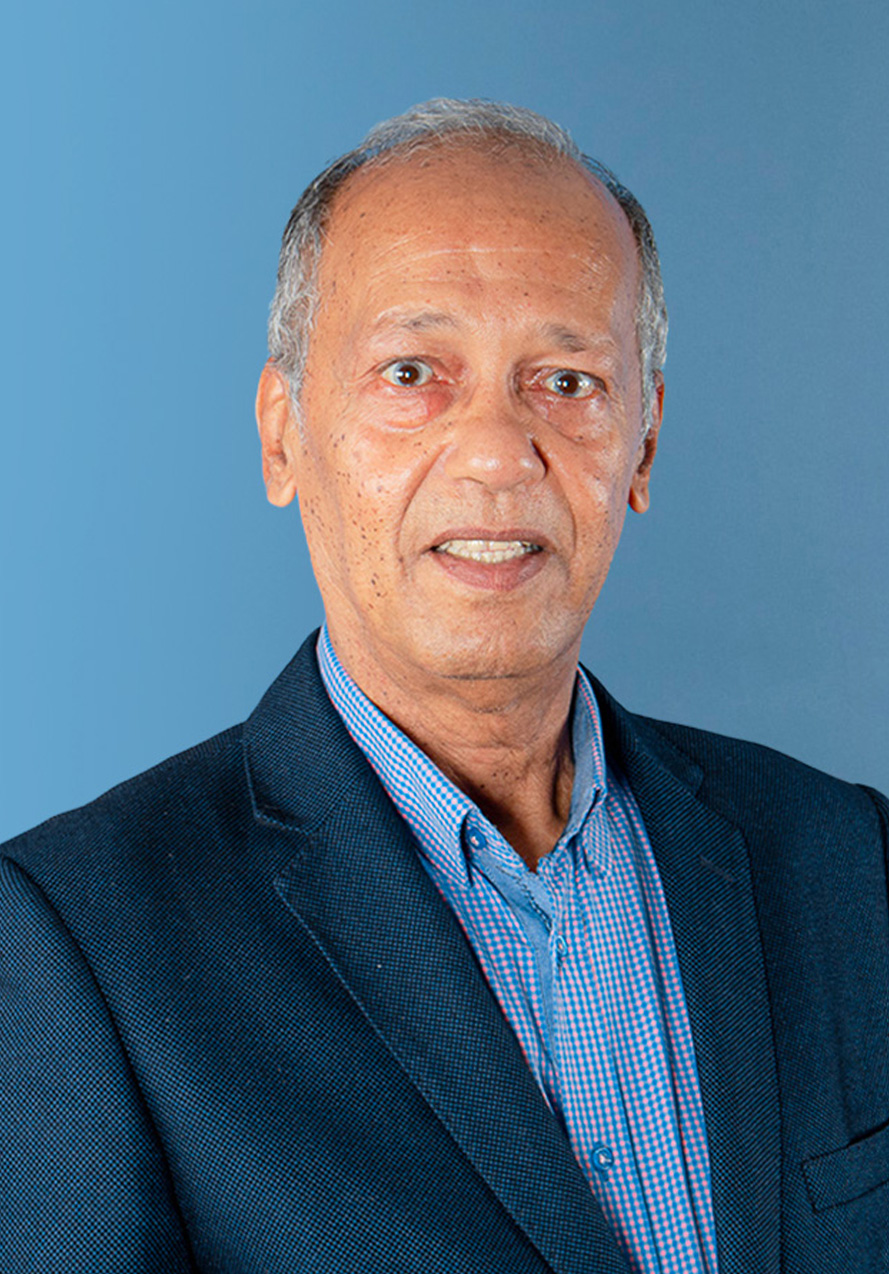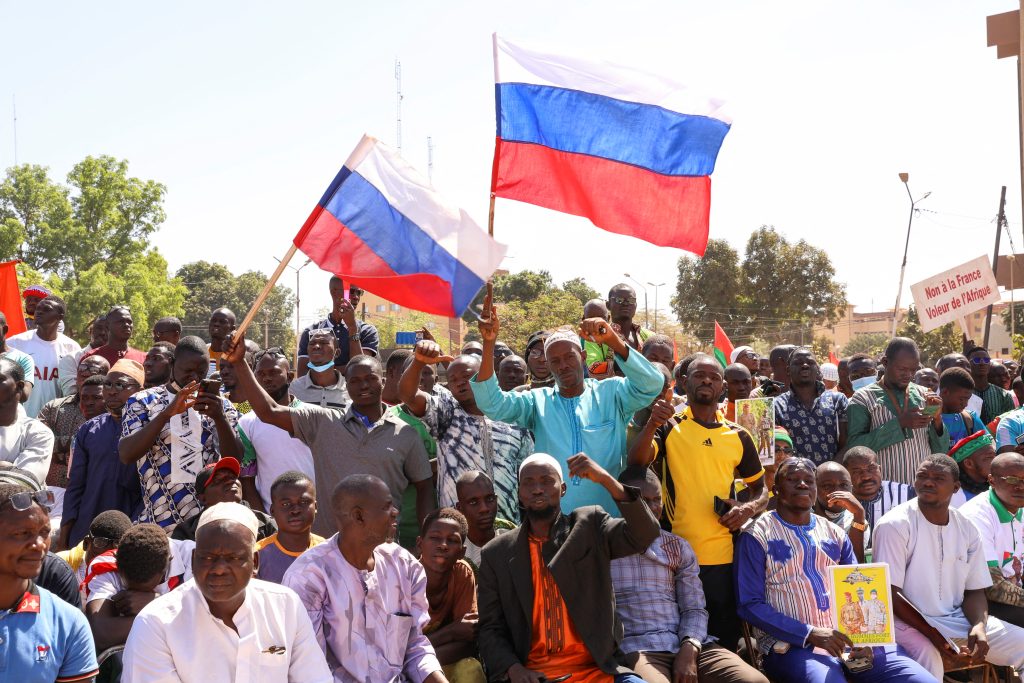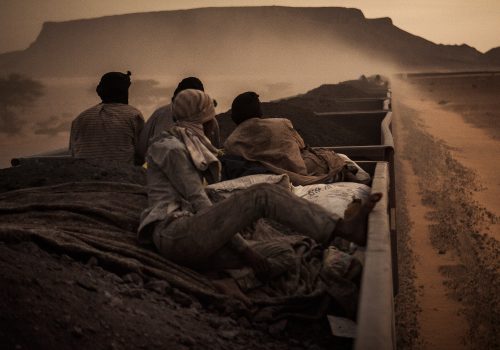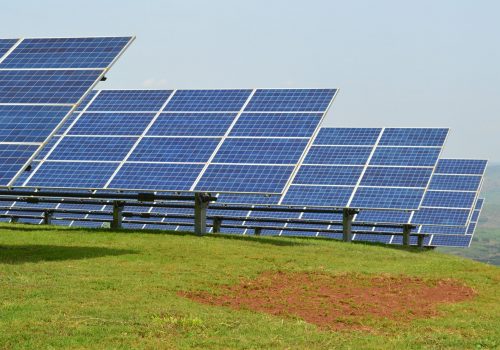Russia’s influence in Africa, a security perspective
Military relations between Russia and Africa, before and after the war in Ukraine
English
In partnership with the Policy Center for the New South (PCNS), the Africa Center is proud to present a joint report on Russia’s influence in Africa, a security perspective on the first anniversary of the war in Ukraine.
Africa emerged as a major player in this conflict on March 3, 2022, when seventeen African states abstained from voting on the United Nations General Assembly resolution condemning the Russian invasion of Ukraine. The number of abstaining countries was surprising, as well as which specific nations abstained; some, like Morocco and Senegal, are known for their proximity to the Western camp. Moreover, unambiguous statements that accompanied nations’ votes made their intentions patent: Some invoked the hypocrisy of the Western world, quick to save Ukraine while ignoring wars in Africa. Other nations expressed grievances regarding the treatment of African students at the Polish border in the early days of the conflict. Others still wished to preserve the Russia that fought on their side during wars of independence and fought the racist regime of apartheid in South Africa. Finally, some nations wished to remain non-aligned with either of the belligerents, so as not to threaten commercial relationships, or simply remain neutral towards a war that did not concern them.
Despite these intentions, Africa was quickly roped into the conflict. On June 3rd, Russian President Vladimir Putin met with Senegalese President Macky Sall, in his capacity as current Chair of the African Union (AU), to discuss blocked grain shipments that threatened to worsen food insecurity in Africa. Their meeting in Sochi was publicized internationally. The energy crisis and Europe’s supply chain issues then drew the African continent as courted player in the conflict, with a string of natural resource discoveries from Senegal to Mozambique promising potential alternatives.
The beginning of 2023 ushered in an elaborate diplomatic dance that included visits by Russian Foreign Minister Sergey Lavrov to Angola, South Africa, Eswatini, Tunisia and Mauritania. Qin Gang, China’s new Minister of Foreign Affairs, visited five countries including Ethiopia and Egypt. Following suite, U.S. Treasury Secretary Janet Yellen made an unexpected visit to Senegal, Zambia, and South Africa. The Ambassador to the United Nations Linda Thomas-Greenfield, Vice President Kamala Harris, Secretary of Defense Lloyd Austin and the presidential couple then did the same. With the upcoming Russia-Africa Summit in St. Petersburg and the BRICS Summit in Durban, hosted by South Africa, in summer 2023, the United States is determined to flex the resources at its disposal to plead its case. At the US-Africa Summit in December 2022, the country pledged to invest $55 billion in Africa over the next three years, to reform the Bretton Woods institutions, and to help improve Africa’s representation within the G20 and the United Nations Security Council.
This summit – the first of its kind in eight years – followed the China-Africa summit held in Dakar in November 2021, the European Union-African Union meeting in Brussels in February 2022, the 17th CII-EXIM Bank Conclave on the India Africa Growth Partnership in July 2022, and the Tokyo International Conference on African Development (TICAD) in August 2022. The United States, which had seemingly withdrawn interest in Africa under President Donald Trump’s isolationist “America First” policy and had then given priority to the Indo-Pacific region and Ukraine under President Joe Biden, had no choice but to re-engage. The nation is no longer merely concerned with managing emergency crises but also seeking new strategic alliances. After a year of war in Ukraine, Africa has emerged as the epicenter of a new geopolitical order with two competing multilateral systems pitted against one another.
The Africa that the United States is seeking to re-engage with has changed significantly. It is important to shift the paradigm and adopt a more creative approach to foreign policy. For a long time, a strategic approach to foreign policy that dates from the Cold War has dominated. This began when the West sought to contain communist advance in the continent, and persisted in the anti-terrorist struggle against Al Qaeda and the Islamic State organization. The deal was simple: the West would favor and trade with countries that supported Western priorities. This made it impossible for African states to remain neutral. Worse still, concerns for democracy and African economic emergencies were never a priority; we even saw autocratic regimes receive quiet support on the grounds that they were anti-communist or aiding in the fight against terrorism.
This simplistic approach has done much to weaken the position of the West in Africa. It continues to influence African perceptions, by giving credence to Russian disinformation campaigns. Today, double talk and double standards are tolerated less and less and encounter increased scrutiny from young Africans who are quick to mobilize through social media. There is nothing more devastating to the West than to turn a blind eye to certain autocracies while vilifying others, or to legitimately oppose Russian aggression in Ukraine while largely ignoring the tragic situation in the Great Lakes for the past thirty years.
It is important to re-engage with an approach that foregrounds the needs of African populations and orients the actions of development agencies, while adopting a cooperative approach that respects the decision-making autonomy of African states. This is especially important because development impacts security, and its failures can tip impoverished populations into war. A myriad of issues must be addressed, including the decisive role of women, youth employment, the pacification of community relations, local governance, global warming, and the opening of schools. It is imperative to provide practical solutions to these issues, which, if left unresolved, will continue to drive African populations into the arms of dark forces.
The situation in the Sahel offers a striking illustration. After fighting a futile war against the terrorist threat for 10 years, French and European troops in Barkhane, Tabuka, and Sabre have been asked to pack their bags by the new rulers of Bamako and Ouagadougou, who rose to power following three military coups. The MINUSMA (United Nations Multidimensional Integrated Stabilization Mission in Mali) has been minimally renewed and stands precarious. Popular protests of Western, and particularly French, interference have erupted throughout the region. Some protestors have been seen brandishing Russian flags and, more menacingly, there have been sightings of Wagner militia troops. Though ostracized in Europe for its war against Ukraine, Russia seems far more welcome on the African continent.
How deep are the roots of Russian influence in Africa? Thirty years after the end of the Cold War, what is Vladimir Putin’s ambition in a region where he has signaled great interest? How can the West respond to this strategy of influence and sway young African opinions that seek a path to sovereignty for their continent? Is it possible for former European powers to overcome the mistrust that endures from the colonial period? What will cooperation with the United States entail? Historically, the United States has successfully convinced several parts of the world of the strength of its model. Will it succeed in reaching African hearts and minds today?
The authors of this report, Sarah Daly and Abdelhak Bassou, are fellows at the Atlantic Council and Policy Center for the New South and analyze Russia’s role in Africa from a security perspective. Beginning from a historical understanding of Russian relations since the fifteenth century, they analyze the evolution and current dynamics of the nation’s influence. Considering the security tools Russia deployed on the continent (including training, technology transfer, defense agreements, militias, etc.), they examine the sustainability of Russian strategy in light of the uncertain war in Ukraine and African expectations. This report, published in both English and French for the first time since our collaboration began, is a valuable resource to understand the critical changes underway for the continent and their impact on the rest of the world.
Amb. Rama Yade, Senior Director, Africa Center
Karim El Aynaoui, Executive President, Policy Center for the New South
Français
En partenariat avec le Policy Center for the New South (PCNS), Africa Center est fier de présenter un rapport conjoint sur l’influence de la Russie en Afrique, une perspective sécuritaire, à l’occasion du premier anniversaire de la guerre en Ukraine.
L’Afrique est apparue comme un acteur majeur de ce conflit lorsque le 3 mars 2022, dix-sept Etats africains se sont abstenus lors du vote de la résolution de l’Assemblée générale des Nations Unies condamnant l’invasion russe en Ukraine. Le nombre a surpris, tout autant que l’identité des pays abstentionnistes dont certains, à l’instar du Maroc et du Sénégal, sont connus pour leur proximité avec le camp occidental. De plus, les explications de vote , argumentées et sans ambiguïté, qui ont été avancées par ces Etats montraient leur détermination: certains ont invoqué l’hypocrisie du monde occidental, prompt à sauver l’Ukraine tout en ignorant les guerres africaines, d’autres ont voulu manifester leur mauvaise humeur face au traitement réservé aux étudiants africains à la frontière polonaise aux premières heures du conflit, une 3ème catégorie de pays ont voulu préserver une Russie qui fut à leurs côtés pendant les indépendances et a combattu, en Afrique du Sud, le régime raciste de l’apartheid. D’autres, enfin, ont voulu se placer à équidistance des belligérants – ayant des relations commerciales avec tous – ou tout simplement rester neutres, au nom du non-alignement par rapport à une guerre qui ne les concernait pas.
Quoique. Très vite, l’Afrique a été impactée par ce conflit, comme l’a montré la rencontre mondialement médiatisée du 3 juin à Sotchi entre le Président russe, Vladimir Poutine, et le Président Macky Sall du Sénégal, en sa qualité de Président en exercice de l’Union africaine (UA), alors que le blocage des stocks de céréales menaçait d’aggraver l’insécurité alimentaire en Afrique. La crise de l’énergie et les difficultés d’approvisionnement de l’Europe ont fait ensuite du continent un acteur courtisé du conflit en attirant l’attention sur les ressources africaines, où du Sénégal au Mozambique, nombre de découvertes récentes en ressources naturelles en font une alternative très séduisante.
Ce début d’année 2023 est ainsi marqué par un impressionnant ballet diplomatique qui a vu le Ministre des Affaires Étrangères russe, Serguei Lavrov, se rendre en Angola, en Afrique du Sud, en Eswatini, en Tunisie et en Mauritanie. Qin Gang, le nouveau Ministre chinois des Affaires étrangères, lui, s’est déplacé dans cinq pays dont l’Ethiopie et l’Egypte. À sa suite, c’est la Secrétaire américaine au Trésor, Janet Yellen, qui, de manière inattendue, s’est rendue au Sénégal, en Zambie et en Afrique du Sud avant que l’Ambassadrice aux Nations Unies, Linda Thomas-Greenfield, la Vice-Présidente Kamala Harris, le Secrétaire à la Défense Lloyd Austin et le couple présidentiel ne lui emboîtent le pas. Alors que s’annoncent à l’été 2023 un Sommet Russie-Afrique à Saint-Pétersbourg et un Sommet des BRICS sous présidence sud-africaine à Durban, les Etats-Unis se montrent désormais déterminés à utiliser les outils à leur disposition pour mieux convaincre: ainsi, à l’occasion du Sommet Etats-Unis-Afrique de décembre 2022, ils se sont engagés à investir en Afrique 55 milliards de dollars sur trois ans, à réformer les institutions de Bretton-Woods, à soutenir une meilleure représentation de l’Afrique au sein du G20 comme du Conseil de sécurité des Nations Unies. Ce sommet – le premier en huit ans – faisait suite au sommet Chine-Afrique de Dakar en novembre 2021, à la rencontre Union européenne-Union africaine de Bruxelles en février 2022, au 17ème conclave de la banque CII-EXIM sur le partenariat de croissance Inde-Afrique en juillet 2022 et à la Conférence internationale de Tokyo sur le développement en Afrique d’août 2022, TICAD. Les Etats-Unis, qui avaient jusqu’alors semblé en retrait de l’Afrique au nom du principe isolationniste « America First » sous Donald Trump, puis de la priorité donnée à l’Indo-Pacifique et à l’Ukraine sous Joe Biden, n’avaient d’autre choix que de relever leur niveau d’implication. Il ne s’agit plus seulement de gérer les crises dans l’urgence mais de rechercher de nouvelles alliances stratégiques. Après un an de guerre en Ukraine, c’est l’Afrique qui est devenue l’épicentre d’un nouvel ordre géopolitique où se disputent deux systèmes multilatéraux concurrents.
L’Afrique dans laquelle les Etats-Unis cherchent à se réengager, a aussi beaucoup évolué. Il est important de changer de paradigme et d’adopter un usage plus créatif de la politique étrangère. Pendant longtemps, la Guerre froide a donné lieu à un usage stratégique de la politique étrangère, l’Ouest cherchant en priorité à contenir la poussée communiste sur le continent. Cette stratégie s’est poursuivie dans le cadre de la lutte anti-terroriste contre Al Qaida et l’organisation État islamique. Le deal était simple : il fallait privilégier et faire commerce avec ceux qui soutenaient les priorités occidentales. Dès lors, il devenait impossible pour les États africains de rester neutres. Pire encore, la question démocratique ou les urgences économiques africaines n’étaient pas prioritaires dans un tel scenario et on a même vu ainsi des régimes autocratiques être soutenus à bout de bras au motif qu’ils étaient anti-communistes ou qu’ils apportaient leur aide à la lutte anti-terroriste. Cette approche simpliste a beaucoup contribué à affaiblir les positions occidentales en Afrique. D’une certaine manière, elle continue à avoir cours, donnant du crédit aux campagnes de désinformation russes. À une époque où les doubles discours ou les doubles standards sont de moins en moins tolérés et de plus en plus scrutés par les jeunes opinions africaines stimulées par la puissance mobilisatrice des réseaux sociaux, il n’y a rien de plus dévastateur que de fermer les yeux sur certaines autocraties tout en en vilipendant d’autres, ou encore de s’offusquer légitimement de l’agression russe en Ukraine tout en ne prêtant pas la même attention à la situation tragique qui perdure depuis trente ans dans les Grands Lacs.
Il est important de renouer avec une approche qui tienne davantage compte des besoins des populations africaines et d’orienter l’action des agences de développement dans le sens du, avec une approche plus coopérative et respectueuse de l’autonomie de décision des Etats africains. Parce que le développement est aussi une question de sécurité, toute faillite en ce domaine étant alors susceptible de faire basculer les populations paupérisées vers la guerre. Qu’il s’agisse du rôle déterminant des femmes, de l’emploi des jeunes, de la pacification des relations communautaires, de la gouvernance locale ou du réchauffement climatique, de l’ouverture des écoles, il est impératif d’apporter des réponses efficaces à ces questions fondamentales qui, si elles demeuraient non résolues, continueraient à précipiter les populations africaines dans les bras de forces obscures.
Illustration éclatante de cette tension: la région Sahel où, après 10 ans d’une vaine guerre contre la menace terroriste, les troupes françaises et européennes de Barkhane et Tabuka en passant par Sabre ont été priées de plier bagage par les nouveaux maîtres de Bamako et de Ouagadougou, issus de trois coups d’État militaires, tandis que la Minusma (Mission multidimensionnelle intégrée des Nations Unies pour la stabilisation au Mali) a fait l’objet d’une reconduction aussi précaire qu’a minima. Partout, dans la région, monte une protestation populaire contre l’ingérence occidentale, notamment française, au fur et à mesure qu’apparaissent des drapeaux russes dans certains cortèges et, de manière plus menaçante, les troupes de la milice de Wagner. Isolée en Europe dans sa guerre contre l’Ukraine, la Russie semble moins l’être sur le continent africain.
Quelles sont l’étendue et les racines de l’influence russe en Afrique? Trente ans après la fin de la Guerre froide, quel est l’objectif de Vladimir Poutine dans une région où il affiche de grandes ambitions? Comment les Occidentaux peuvent-ils répondre à cette stratégie d’influence et séduire les jeunes opinions africaines à la recherche d’une voie plus souveraine pour leur continent ? Est-il possible pour les anciennes puissances européennes de surmonter les méfiances héritées de la période coloniale? Quelle coopération avec les Etats-Unis ? Ceux-ci ont su, à plusieurs phases de leur histoire, convaincre une partie du monde de la force de leur modèle, sauront-ils aujourd’hui atteindre les cœurs africains?
Les auteurs de ce rapport, Sarah Daly et Abdelhak Bassou, fellows à Atlantic Council et Policy Center for the New South, analysent le rôle de la Russie en Afrique d’un point de vue sécuritaire. Partant d’une perspective historique depuis le XVème siècle, ils analysent les évolutions puis les ressorts actuels de l’influence russe. Décrivant les outils sécuritaires déployés par les Russes sur le continent – formation, transfert technologique, accords de défense, milices etc -, ils interrogent également la soutenabilité d’une telle stratégie à la lumière de la guerre incertaine engagée en Ukraine et des attentes africaines. Ce rapport, publié en anglais et en français pour la première fois depuis notre collaboration, est une ressource précieuse pour comprendre le caractère crucial des mutations en cours pour le continent et leur impact sur le reste du monde.
Amb. Rama Yade, Senior Director, Africa Center
Karim El Aynaoui, Executive President, Policy Center for the New South
Report authors

Abdelhak Bassou
Senior Fellow
Policy Center for the New South
Read Dr. Bassou’s bio
Abdelhak Bassou is Senior Fellow at the Policy Center for the New South, Member of its Editorial & Research Oversight Steering Committee, and Affiliate Professor at the Faculty of Governance, Economic and Social Sciences (FGSES) of the Mohammed VI Polytechnic University (UM6P).
Specializing in security, strategy and defense studies, he previously occupied several offices within the Directorate General of the Moroccan National Security where he was Borders’ Division Chief from 1978 to 1993. He was appointed Director of the Royal Institute of Police in 1998, before serving as the Chief of Regional Security in Errachidia from 1999 to 2003, and Sidi Kacem from 2003 to 2005. In 2006, he became Head of the Central General Intelligence until 2009. Bassou contributed to the output of several endeavors of international organizations including the Council of Arab Interior Ministers from 1986 to 1992, where he represented the Directorate General of National Security in various meetings.
Since 2018, Bassou has been directing and editing the collectively written annual report on Africa’s geopolitics, originally titled ‘Miroir d’Afrique’ and published by the Policy Center for the New South. His works have been featured in numerous world-renowned think tanks and institutions, including a contribution in ‘Towards EU-MENA Shared Prosperity’ (Bruegel, 2017), Evolving Human Security Challenges in the Atlantic Space (Jean Monnet Network, 2019), and is also recurring author and participant in the HEC-PCNS Strategic Dialogues and its corresponding written volumes.
Abdelhak Bassou holds a Master’s Degree in Political Science and International Studies from the Faculty of Law, Economics and Social Sciences of Agdal in Rabat.
Related Content

The Africa Center works to promote dynamic geopolitical partnerships with African states and to redirect US and European policy priorities toward strengthening security and bolstering economic growth and prosperity on the continent.
Image: Men hold Russian flags as they gather to show their support to the Junta leader Ibrahim Traore and demand the departure of the French ambassador at the Place de la Nation in Ouagadougou, Burkina Faso January 20, 2023. REUTERS/Vincent Bado



